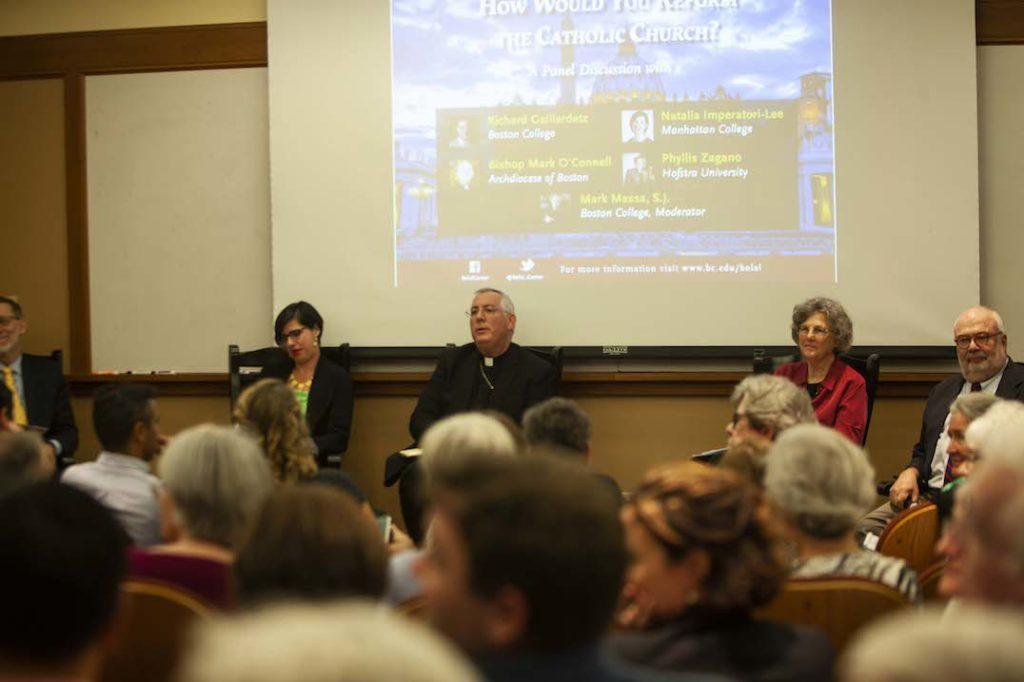The Boisi Center for Religion and American Public Life hosted a panel titled “How Would You Reform the Catholic Church?” on Tuesday. Moderated by Rev. Mark Massa, S.J., of Boston College, the panel spoke on the biggest issues it sees in the Catholic Church.
The four invited speakers focused on two main themes—expanding the voice and role of marginalized groups in the Church, particularly women, and increasing the accountability of the Church to its communities.
Phyllis Zagano, an author and professor at Hofstra University, argued that the Church needs to reinstate women as deacons in the Catholic Church. Zagano has served on the Vatican Commission on Women Deacons, which studied the history of women deacons. She emphasized the need for the Church to return to its historical roots and allow women to become deacons.
Zagano argued that there is strong historical evidence to support the claim that women used to serve as deacons, such as historical records of female deacons examining bruises on women from domestic violence.
“Why do we need women deacons?” Zagano said. “Well, to provide ministry to women, to let women rejoin the clerical state, and to support the Church’s teaching that all are made in the image and likeness of God.”
In a similar vein, Natalia Imperatori-Lee, a religious studies professor at Manhattan College, pushed for the Church to be more inclusive of marginalized groups, namely women and cultures in the Global South.
To illustrate her point, Imperatori-Lee shared the story of her son’s all-male school. She met with her son’s English teacher, who laid out the authors they would read that semester, from Edgar Allan Poe to Sophocles to Shakespeare.
“And then it hit me: ‘Oh my God, what if he never reads a woman?’” Imperatori-Lee said. “What if, in this very elite, single-sex Catholic environment, my son never finds out that women have something interesting to say about history, or story-telling, or theology?
“Here’s the thing: What I don’t want for my son, I don’t want for my Church. It sounds simple, but the execution of this probably won’t be. My institutional contribution to the reform of the Church would be to dismantle the seminary system as it currently exists.”
Imperatori-Lee argued that the isolation that comes with the seminary system is at the heart of the abuse crisis, and seminarians should undertake their formation alongside the laity, while also being exposed to a wider variety of theological writings, especially those written by women and people from the Global South.
Bishop Mark O’Connell of the archdiocese of Boston stressed the need to hold bishops accountable for child sex abuse within the Church. He argued that Church policy has been inadequate, especially in giving bishops too much discretion in deciding how to address accusations against priests.
O’Connell said that in investigations, bishops who have allowed these priests to remain in service have been following Church rules, although he made a point to not excuse that complacency.
In response, O’Connell said he would mandate lay involvement in decisions over what to do with accused priests and priests who have been found to act immorally, which would give the decision-making process a wider perspective and increase accountability in the Church.
“I do not think the [canon] law is strong enough,” O’Connell said. “it still leaves aspects to the discretion of the bishop, assuming the bishop would act prudently, and I would rewrite that law.”
Richard Gaillardetz, chair of the theology department at BC, focused on what he sees as a disconnect between the Church hierarchy and the laity. With papal appointments becoming more common and two-thirds of bishops actually overseeing a diocese, being appointed as bishop has become an honor rather than a service, Gaillardetz said. The Church, he argued, should return to the practice of letting local communities choose their bishop.
“Many will agree that a lack of episcopal accountability lies at the heart of our clerical sexual abuse crisis. A return to the active role of the local Church in the selection of a bishop would go a long way toward helping us recover that accountability.”
While most speakers expanded on their earlier points when given a second opportunity to speak, O’Connell changed his tone and focused specifically on reintegrating people back into the Church. Focusing too much on specific rules early on, he argued, is counterproductive—instead, the Church should focus first on integration and then on the rules.
O’Connell proposed a program for returning Catholics that is similar to the current program for potential Catholic converts, the Rite of Christian Initiation for Adults (RCIA). This program would excuse potential returners from attending Mass while they are in the process of reintegration.
“You fall in love with baseball long before you learn the infield fly rule,” O’Connell said. “Sometimes when people come back to church, instead of falling in love with the liturgy, we start with the infield fly rule. Are you divorced? Are you gay? Are you married in the Church? Are you committing mortal sin by not going to Mass?”
Featured Image by Ikram Ali / Heights Editor
Correction (10/01/19, 12:02 p.m.): The Church in the 21st Century Center was incorrectly named as the sponsor of the event, rather than The Boisi Center for Religion and American Public Life.







